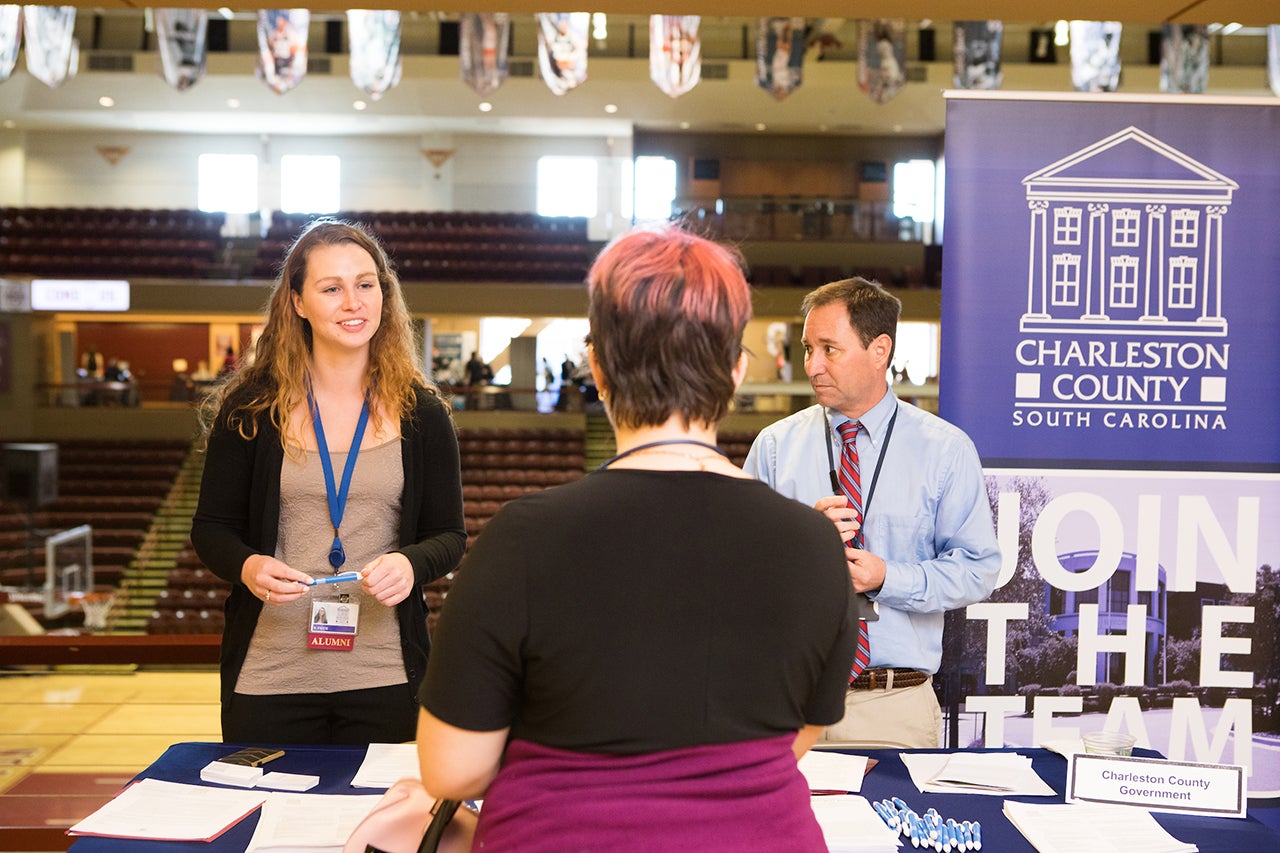Now that spring break is over, it’s time to get serious about landing that summer internship you’ve been thinking about. A bachelor’s degree is critical to securing an interesting, well-paying job, but real-world experience is also key.
“This is how companies mine for talent,” says Jim Allison, the executive director of the College’s Career Center, noting that there’s about a 70 percent conversion rate from internships to job offers. “You also learn what you do/do not want to do or like to do. Essentially, internships are a bridge from education to employment.”
The Career Center has relationships with hundreds of companies, having already helped students land summer internships at JP Morgan, the South Carolina Department of Commerce, Tommy Hilfiger, Ernst & Young, and Booz Allen Hamilton, among others.
But where do you start? Like most new job opportunities, it starts with a handshake. Handshake is the College of Charleston’s new online job and internship database, home to hundreds of searchable internships, full-time and part-time positions available through thousands of companies.
“Handshake gives us an opportunity to advertise more national opportunities for our students,” says Kristin Wichmann, the department’s new experiential learning coordinator who helps students apply the analytical, oral, and written skills they learn at the College outside the classroom. “Students are encouraged to work with our staff to target their internship searches using resources to identify both local and out-of-town opportunities.”
The Career Center website also has a number of resources for students to mine, such as the internship weblinks page, which lists the career fairs each semester. Of course, if you’d like a little more personal attention, the Career Center staff is always ready to help. Last fall, The Princeton Review ranked the center No. 1 among all public master’s level institutions and No. 18 among all institutions. All you have to do to take advantage is visit them at their second-floor offices in the Lightsey Center.
“We have internships for all majors, all years,” says Allison. “It’s not an intimidating environment: you do not have to have a résumé or plan in place to benefit from visiting or using the office. We are here to help you get to that point.”
 The center helped senior communication major Mariah Hoffman secure an internship at Vaetas, a video marketing company here in Charleston between her sophomore and junior years. She has since secured three other internships on her own, including ones at high-profile PR firms in Dublin, Ireland, and New York City, by being resourceful and utilizing the tools she learned at the Career Center. What have her internships taught her? How to act in a professional setting, how to research potential clients and how to create media-training guides for executives, says Hoffman.
The center helped senior communication major Mariah Hoffman secure an internship at Vaetas, a video marketing company here in Charleston between her sophomore and junior years. She has since secured three other internships on her own, including ones at high-profile PR firms in Dublin, Ireland, and New York City, by being resourceful and utilizing the tools she learned at the Career Center. What have her internships taught her? How to act in a professional setting, how to research potential clients and how to create media-training guides for executives, says Hoffman.
“They were all very helpful,” says Hoffman, who won the Career Center Internship Award her junior year, which comes with a $2,500 stipend to cover rent. “They really help you decide what you’re interested and not interested in. Internships are a great introduction into professional life.”
Hoffman has two pieces of advice for prospective interns: be fearless and market yourself. “Don’t be afraid to reach out to anyone. I found my first internship after my freshman year just by Googling PR companies in Tampa, where I was spending the summer with my mom. The worst that can happen is they say no or don’t respond. But be sure to let them know what you can do for them, even if it’s only that you’re a hard worker.”
Some majors, like arts management, hospitality and tourism management, and women and gender studies require a for-credit internship to graduate (scroll down the internship weblinks page for internship requirements by department), but most internships or experiential learning opportunities, like job shadowing, are not for credit. But that doesn’t make them any less valuable.
“At their best, internships provide an opportunity for our students to apply what they are learning in the classroom to a professional setting,” says Allison, noting that 67 percent of students complete at least one internship here at the College, which is higher than the national average. “Students receive guidance, mentorship and regular feedback from an experienced professional in the field. Internships allow students to enhance and gain the industry-specific and transferable, or soft, skills that are essential to succeed in the workplace.”





